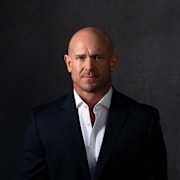UFC Veteran and Green Beret Tim Kennedy: I've Failed, I've Failed, and It's Why I'm Still Here

Tim Kennedy's story is one of undeniable success across multiple domains: mixed martial arts, special forces, and entrepreneurship. However, the remarkable aspect of his journey is not just his triumphs but his deep understanding of failure's role in reaching those milestones. For a wildly successful man, Kennedy's embrace of failure sets him apart from others. In a world where success is celebrated and failure is often shunned, Kennedy's perspective offers powerful insights into human performance and personal growth.
The Power of Embracing Failure
Kennedy openly acknowledges that failure has shaped him more than success. As he puts it, "It's not the success that gives you the humility; it's thinking about the times you could have done it better." Whether reflecting on his time in combat, the octagon or leading his businesses, Kennedy doesn't just see failure as a negative. Instead, he views it as a critical learning tool that drives improvement. Each failure becomes a moment for self-reflection, showing him what could have been done better and how to move forward.
Psychological research supports Kennedy's viewpoint. According to studies on growth mindsets, individuals who view failure as an opportunity to learn and grow tend to achieve higher levels of success in the long run. Failure creates a pathway for improvement, offering insight into areas that need development. The key is resilience—something Kennedy exemplifies in both his mindset and approach to life.
What You Don’t See Behind Success
For those unfamiliar with the struggles behind Tim Kennedy's successes, it might seem as if everything he touches turns to gold. But Kennedy quickly reminds us that what we see—the championships, accolades, and achievements—is only the surface. "People never see the hard parts," he notes, referring to the endless hours of preparation, pain, and setbacks. In fact, Kennedy recalls being on the mat, beaten down, and still finding himself unwilling to quit.
Psychologically, this echoes the concept of grit—a combination of perseverance and passion for long-term goals. Angela Duckworth, a researcher in human performance, found that individuals with high levels of grit are far more likely to succeed over time than those who rely solely on talent. Grit doesn't mean avoiding failure; instead, it's about pushing through failure again and again. Kennedy's career is a prime example of this.
Failure as a Humbling Force
Kennedy also speaks to how failure fuels humility, another critical factor in sustained success. "Every one of those failure points causes humility," he explains, adding that the failures keep him grounded and focused. It's easy to become overconfident after repeated wins. Still, those failures are a constant reminder that there is always room to grow. Kennedy believes true humility comes from understanding how much more there is to learn, even when you've reached the top.
This aligns with a broader psychological understanding of leadership and high performance. Humility has been shown to improve learning outcomes, enhance teamwork, and create a more adaptive mindset. Leaders who remain humble are not only better at learning from their mistakes, but they also foster an environment where failure is viewed as part of the process, not something to be feared.
Redefining Success
Tim Kennedy's story reminds us that success isn't about perfection. Instead, it's about pushing through setbacks and becoming stronger because of them. He has failed countless times in his pursuit of greatness, but those failures have made him the man he is today. "I failed and I failed and I failed, but I’m still here," Kennedy states confidently. And that, perhaps, is the ultimate lesson: Failure is not the end—it's the beginning of growth, resilience, and long-lasting success.
Kennedy's approach is refreshing in a culture that often seeks to avoid failure at all costs. His story demonstrates that embracing failure doesn't mean accepting defeat—it means understanding that setbacks are the building blocks of achievement, shaping us into better versions of ourselves.
